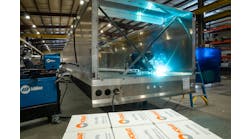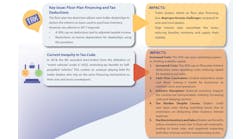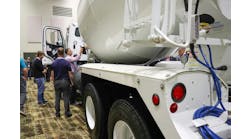NTEA – The Association for the Work Truck Industry announced its support for legislation to repeal the 12% Federal Excise Tax (FET) on heavy trucks and trailers. H.R. 1440 was introduced by U.S. Representatives Doug LaMalfa (R-CA), Chris Pappas (D-NH), Darin LaHood (R-IL) and Earl Blumenauer (D-OR). A companion bill, S. 694, was introduced by U.S. Senators Ben Cardin (D-MD) and Todd Young (R-IN).
“NTEA commends these congressional leaders for introducing legislation to repeal this burdensome and complex tax which can inhibit fleets from replacing older and less fuel-efficient heavy trucks with safer, environmentally friendly new trucks,” said Steve Carey, NTEA president & CEO.
NTEA continues to call on Congress to repeal FET as a part of any upcoming infrastructure legislation. Eliminating this tax would provide Congress the opportunity to create long-term stability in the Highway Trust Fund by replacing FET with a funding source not based on annual truck and trailer sales.
The 12% FET placed on heavy trucks, truck chassis, bodies and trailers is the highest excise tax charged on any product. It was first levied in 1917 to help pay for World War I. Today it can add thousands of dollars to the price of a new truck and is deposited into the federal Highway Trust Fund. The newly introduced legislation proposes to eliminate the tax more than 100 years after it was created.
“FET repeal is something we've worked on for years and years. With the new technology that's coming out, vehicles will become more efficient but probably more expensive—which means more FET,” Mike Kastner, NTEA senior vice president, told Trailer/Body Builders at Work Truck Week. “That defeats the purpose of trying to get more fuel-efficient vehicles out there, and keeps people holding on to their old vehicles longer.
“There's a great bipartisan set of sponsors that I think provides the best opportunity we've ever seen.”









